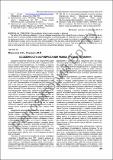| dc.contributor | Brest State Technical University | ru_RU |
| dc.contributor | Брестский государственный технический университет | ru_RU |
| dc.contributor.author | Морозова, Наталья Николаевна | |
| dc.contributor.author | Стрелец, Михаил Васильевич | |
| dc.coverage.spatial | Брест | ru_RU |
| dc.date.accessioned | 2019-11-22T08:50:11Z | |
| dc.date.available | 2019-11-22T08:50:11Z | |
| dc.date.issued | 2013 | |
| dc.identifier.citation | Морозова, Н. Н. Особенности формирования рынка труда в Германии / Н. Н. Морозова, М. В. Стрелец
// Вестник Брестского государственного технического университета. Серия: Гуманитарные науки. – 2013. – № 6. – С. 33–41. – Библиогр.: с. 41 (9 назв.). | ru_RU |
| dc.identifier.uri | https://rep.bstu.by/handle/data/2667 | |
| dc.description | MOROZOVA N. N., STRELETS M. V. The peculiarities of labor market formation in Germany | ru_RU |
| dc.description.abstract | Авторы настоящей статьи попытались осуществить системную реконструкцию формирования рынка труда в Германии. Факты, изложенные в статье, дают основание считать Германию образцом системы занятости в континентальной Европе. Читатель узнаёт, что в этой стране стало реальностью сильное регулирование трудовым
законодательством защиты занятости. Авторы выявили центральную роль коллективных переговоров (тарифных соглашений) в определении заработной платы, рабочего времени и других условий
труда. Они также показывают развитую систему двойного профессионального образования. Обращается внимание и на сосредоточение государства на поддержании социального страхования на случай безработицы. Особо выделяется то обстоятельство, что политика на рынке труда осуществляется с акцентом на профессиональную подготовку и различные формы субсидируемой занятости. | ru_RU |
| dc.language.iso | ru | ru_RU |
| dc.publisher | БрГТУ | ru_RU |
| dc.relation.ispartofseries | Гуманитарные науки; | |
| dc.subject | рынок труда | ru_RU |
| dc.subject | labor market | ru_RU |
| dc.title | Особенности формирования рынка труда в Германии | ru_RU |
| dc.type | Статья (Article) | ru_RU |
| dc.identifier.udc | 322.09 | ru_RU |
| dc.abstract.alternative | The authors of this article have attempted to carry out systematic reconstruction of labor market formation in Germany. The facts stated in the article, give reason to consider Germany a model system of employment in continental Europe. The reader learns that in this country stronger regulation of
the employment protection via labor laws has become a real. The authors identified the central role of collective bargaining (collective agreements) in
the determination of wages, working hours and other working conditions. They also show a well–developed system of dual professional education. Attention is drawn to the state being focused on maintaining social insurance in case of unemployment. They especially highlight the fact that labor market
policy is implemented with a focus on professional training and various forms of subsidized employment. | ru_RU |
